Senior Cleric Urges Citizens To Confront Women With Loose Hijab
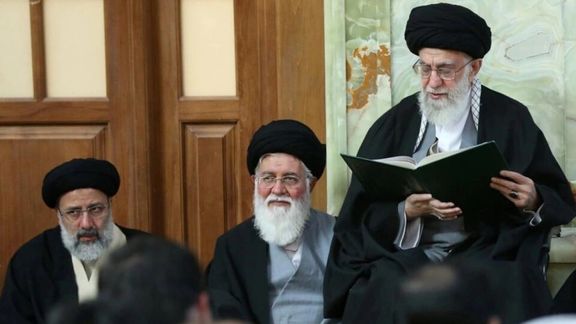
Ahmad Alamolhoda, a senior firebrand cleric who is father-in-law of President Ebrahim Raisi (Raeesi), has urged people to reproach women with poorly-fitting hijab to stop “debauchery.”.

Ahmad Alamolhoda, a senior firebrand cleric who is father-in-law of President Ebrahim Raisi (Raeesi), has urged people to reproach women with poorly-fitting hijab to stop “debauchery.”.
“It is not possible to confront these people with the police and weapons,” said Alamolhoda, who is Supreme Leader Ali Khamenei’s representative in the shrine city of Mashhad. “If a woman in the street removes her headscarf, she must face the complaints of the people to see that she has no place…In such a case, you can be sure that she will wear even two scarves."
Alamolhoda said that law enforcement forces, including the morality police charged with regulating public behavior including dress codes, were not a solution “and even make the situation worse.”
He cited Kamenei as ordering “to fire at will”, metaphorically giving a green light for religious zealots to confront women in the streets, which sometimes leads to physical attacks.
Despite the cleric’s ruling out “weapons,” at least eight acid attacks in Esfahan in 2014 carried out by vigilantes were blamed by some, including Hadi Ghaemi of the US-based International Campaign for Human Rights in Iran, on calls from conservative figures for more ‘Islamic’ standards in dress codes. Alamolhoda spoke out on the issue in January, suggesting that that loose-fitting hijab should not be accepted in public.
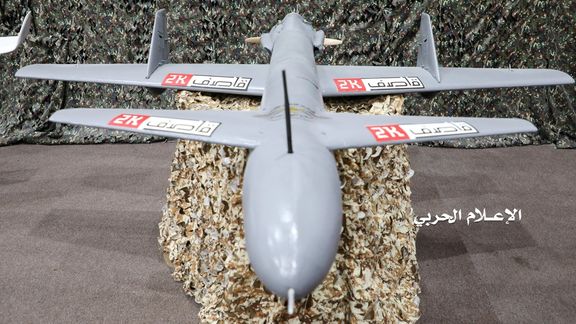
A drone hit a refinery in Saudi Arabia's capital, Riyadh Thursday morning but oil supplies were not affected, Saudi state news agency SPA reported on Friday.
The attack caused a small fire that was controlled and did not result in any injuries or casualties, SPA said citing a statement by an energy ministry official.
"The refinery's operations and supplies of petroleum and its derivatives were not affected," the statement said.
It did not specify where the attack originated from.
The world's top oil exporter has faced frequent missile and drone assaults by Yemen's Iran-aligned Houthi group that has been battling a coalition led by Riyadh for seven years.
The Houthis have not announced any strikes against the kingdom in recent days and the Saudi-led coalition had not issued a statement regarding Thursday's incident.
"These repeated acts of sabotage and terrorism on vital installations and civilian structures ... do not just target the Kingdom but aim to undermine the security and stability of global energy supplies," the statement said.
Saudi Arabia accuses Iran of arming the Houthis and has blamed Tehran for past attacks including a 2019 strike on oil plants. Tehran denies doing so.
The conflict is widely seen in the region as a proxy war between Saudi Arabia and Iran.
Reuters report
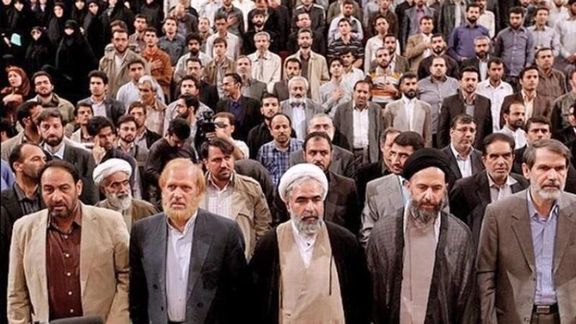
On March 8, Iran's state television changed its program schedule at short notice and prevented the airing of a talk show about the Vienna nuclear negotiations.
According to the producer, the hardliner guests and the host opposed to the nuclear deal, JCPOA, were ready to start the show from an hour before the scheduled live broadcast. The hosts including an unnamed academic and a member of the parliament Yaser Jebraili, as well as four other likeminded hardliners, all Paydari members like the program's host were suddenly told that plans have changed, and they can go home.
This was taken by many political observers in Iran as a sign that Supreme Leader Ali Khamenei who controls the state television no longer tolerates opposition to a deal with the West, whatever the reason.
During the next two days, commentators in Tehran said that in the latest turn of events, the Raisi administration is frowning at ultraconservative Paydari party's maneuvers to influence ongoing events including the attempts to forge a deal with the West to save Iran's ailing economy. Paydari has a strong presence in the conservative-dominated parliament.
Reformist daily Aftab Yazd wrote on Thursday, March 10, that "some of the conservatives [in the Raisi administration] who until yesterday opposed a deal with the United States now want direct talks between Tehran and Washington. This comes while some other conservatives [such as Paydari members] insist on their opposition to any deal with the West."
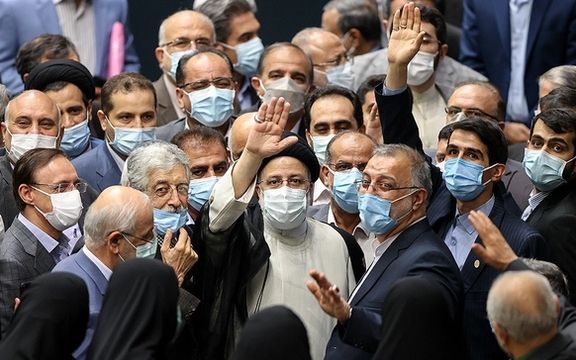
Aftab Yazd mentioned the talk show as an example to make a point. The daily characterized the development as an indication of a deepening divide between Paydari and other conservatives loyal to Raisi and Khamenei. The daily pointed out that almost the same thing happened in 2015, when Iran signed the JCPOA, and opponents had to keep silent under pressure from the government.
On Thursday, President Ebrahim Raisi was quoted as having said that that the government still supports the idea of reaching to an agreement in Vienna as the country needs to make sure that sanctions on Iran are lifted.
Meanwhile, Mohammad Mohajeri, a leading conservative figure, and the former editor of hardliner daily Kayhan, said that an agreement between Iran and the United States will put an end to the anti-JCPOA activities of Paydari. He said the reason why its members have recently began criticizing Raisi and his chief negotiator Ali Bagheri-Kani is that they wish to restore their own shaky and errant identity as a political group.
Paydari was in fact former president Mahmud Ahmadinejad's support base a decade ago, but later many of its members distanced themselves from him as he fell out of favor with Khamenei.
Meanwhile, moderate website Rouydad24 opined in an analysis that it was clear from the beginning of Raisi's term that sooner or later his administration would fall out with other conservative groups. However, few thought that a divide could take shape within a matter of just six months.
The website pointed out that support for the Raisi administration hinges on various groups scrambling for their economic stakes in the system. As soon as the Raisi stops giving them their expected share, they begin to criticize the government.
Criticism of the administration is also fashionable in IRGC media outlets. On Thursday, IRGC mouthpiece Javan Newspaper pointed out in a sarcastic frontpage headline that "Prices refuse to obey orders;" a reference to the fact that Raisi never suggests a solution for economic problems and keeps issuing orders for prices to come down or for poverty to disappear.
As Mohajeri predicted, Paydari could end up as the victim of a new political situation marked by a deal with the United States. Paydari's existence depends on an atmosphere of infighting among various conservative groups, he said. “As soon as a faction’s interests are harmed, it is likely to stand up against other conservatives.”

(Reuters - Analysis) - By single-handedly knocking 13% off rocketing oil prices on one day this week, the United Arab Emirates showed the power of Persian Gulf producers in the market and sent a wake-up call to Washington to pay closer attention to its longtime allies.
OPEC heavyweights Saudi Arabia and the UAE, which both bear grudges against Washington, have snubbed US pleas to use their spare output capacity to tame rampant crude prices which threaten global recession after Russia's invasion of Ukraine.
Wednesday's sharp oil price fall, the biggest one-day drop in almost two years, followed comments by the UAE ambassador to Washington, who said his country supported pumping more oil.
Prices rebounded when the UAE energy minister contradicted him and said the Gulf state stuck by an output pact agreed with OPEC+, which groups the Organization of the Petroleum Exporting Countries and its allies, including Russia.
"This was deliberate," Gulf Research Center Chairman Abdulaziz Sager said of the conflicting UAE comments, adding that the message being sent to Washington was: "You need us, we need you, so let's settle the issues between us."
He said Washington, which flagged Russia's plans to invade Ukraine long before Moscow's troops crossed the border on Feb. 24, should have coordinated more closely with Arab producers in the buildup, rather than turning to them once the crisis hit.
"Gulf states have over many years built a good relationship with Russia, they cannot just overturn things," he said.
The United States wants the Persian Gulf Arab producers to side with the West over the Ukraine crisis but Washington has eroded its political capital with Riyadh and Abu Dhabi by not heeding their concerns about regional rival Iran, ending its support for their war in Yemen and slapping conditions on US weapons sales to them.
REBUILDING TRUST
Saudi Crown Prince Mohammed bin Salman was incensed by President Joe Biden's refusal to deal directly with him as the kingdom's de facto ruler because of the 2018 murder of Saudi journalist Jamal Khashoggi. A US intelligence report implicated the prince, who denies any role.
"There are many problems between the US and its Gulf allies that need to be addressed widely and resolved," said a regional source, saying trust needed to be rebuilt. "It has nothing to do with Russia or the Ukraine war."
The source said Washington should have acted before the Russian invasion. "The US administration knew it was heading towards a crisis. They should have fixed relations with their allies, coordinated and lined them up in advance ... not just expect them to comply and handle oil prices."
Mistrust has built up since the 2011 Arab uprisings when Persian Gulf Arab rulers were shocked at how the administration of President Barack Obama abandoned the late Egyptian President Hosni Mubarak after a 30-year alliance, allowing him to fall and ignoring their concerns over the rise of the Muslim Brotherhood.
Sunni Muslim countries in the region also felt blindsided when Washington reached a nuclear deal with Shi'ite Iran in 2015 that did not tackle Gulf concerns about Tehran's missiles program and regional proxies in Yemen, where the Gulf neighbors have been embroiled in war, and Lebanon, now deep in crisis.
Saudi Arabia felt particularly spurned in 2019 when missile and drone attacks on the kingdom drew a lukewarm US reaction, although Riyadh and Washington both blamed Tehran. Iran denied having a role.
The UAE felt equally frustrated in January when Yemen's Houthis launched attacks on Abu Dhabi. Despite UAE calls for Biden to reinstate a terrorist designation for the Iranian-backed group, Washington has yet to do so.
PHONECALL SNUB
The Gulf source and another source familiar with the matter told Reuters that Biden had irked UAE de facto ruler Abu Dhabi Crown Prince Mohammed bin Zayed, known as MbZ, by not calling swiftly after the Houthis struck.
"Biden called him three weeks after. MbZ didn't take the call. Your ally comes under a terrorist attack and you wait three weeks to call?" the source said.
White House National Security Council spokesperson Emily Horne said on Wednesday there had been "no issues with having a call" and Biden would speak with the UAE leader soon. A UAE foreign ministry spokesperson said a call was being scheduled.
Last month, Biden spoke with Saudi's King Salman while the crown prince, known as MbS, was in the room. Sources said Biden had asked to speak with the crown prince but MbS declined because the call had only been scheduled with the king.
The White House and Saudi government did not immediately respond to a Reuters requests for comment on the episode. The White House told a briefing on Monday there were no plans "at this point" for Biden to call MbS.
The Ukraine crisis has erupted as the United States, Russia and other world powers have been in talks to revive the nuclear pact with Iran. But Moscow may have derailed those efforts for now by demanding guarantees from Washington that Western sanctions on Russia do not affect its business with Iran.
Regional Sunni Arab states have long felt their concerns have not been addressed in those talks, fearing a deal will empower Iran and its regional proxies.
Persian Gulf oil producers are still likely to side with the United States, which they depend on for their security, over their ties with Russia that focus on energy and business.
"Ultimately, the US does have clout, but the Saudi and Emirati resistance threshold is particularly high at present, given their deep dissatisfaction with US policy towards them," said Neil Quilliam, associate fellow at Chatham House.
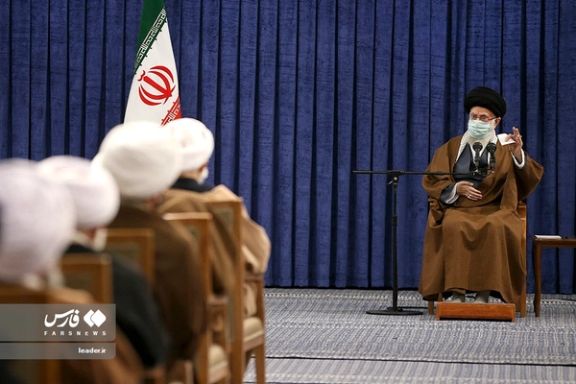
Iran’s Supreme Leader Ali Khamenei says retreating against the United States in exchange for sanctions relief would be a “big and naive mistake.”
Addressing members of Iran’s Assembly of Experts on Thursday, Khamenei insisted that to retreat in the face of American pressure or any other power for securing protection against sanctions, will deal a blow to the nation's power.
He added that Islamic Republic’s presence in regional countries and its nuclear program are two factors that contribute to the country’s national power, saying, “Regional presence gives us more strategic depth and national strength. Why should we give it up? Scientific nuclear progress is needed for country’s future”.
Khamenei said it is naïve to reduce Iran’s military programs to get concessions from the West, noting that “security” and military power contributes to Iran’s bargaining power “to fulfill national interests at the regional and global front.” He added, “It is vital for any country to have national power”.
Iran has boosted its uranium enrichment since the United States withdrew from the 2015 nuclear agreement and continued it support for regional militant groups that act as its proxies in various countries. It has also expanded its missile program that West and several regional countries, such as Israel and Saudi Arabia are concerned about.
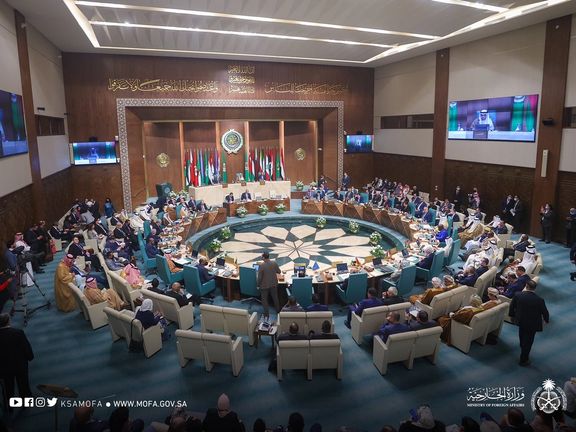
The Arab League has once again criticized the Islamic Republic for its support of militant groups in Arab countries and its ballistic missile program.
The Council of the League of Arab States, which was held at the level of foreign ministers on Wednesday in Cairo, expressed concerns over Iran’s support for separatist elements that threaten Morocco's integrity.
The meeting endorsed a resolution proposed by the Ministerial Committee of the Arab Quartet – comprised of Saudi Arabia, the United Arab Emirates, Bahrain, and Egypt as well as the Secretary-General of the Arab League, and tasked with monitoring and countering Iran’s interventions.
The resolution calls for solidarity with Morocco in confronting the interference of Iran and its ally Hezbollah through arming and training the separatists, describing them as an extension of the Tehran's actions aimed at undermining regional security and stability.
In January, Iran’s Foreign Ministry rejected Moroccan Foreign Minister Nasser Bourita’s claims that the Islamic Republic wants to infiltrate Africa and expand Shiite ideology on the continent, describing the remarks as “unfounded projections”.
Morocco severed diplomatic ties with Iran in 2018, saying the Tehran-backed Lebanese group Hezbollah was training Polisario Front separatist fighters against Morocco in Western Sahara.
Iran-backed Houthis have also launched missile and drone attacks on three occasions against the UAE in January.
Many countries in the region accuse Iran of interference in their domestic affairs by using armed proxy groups.